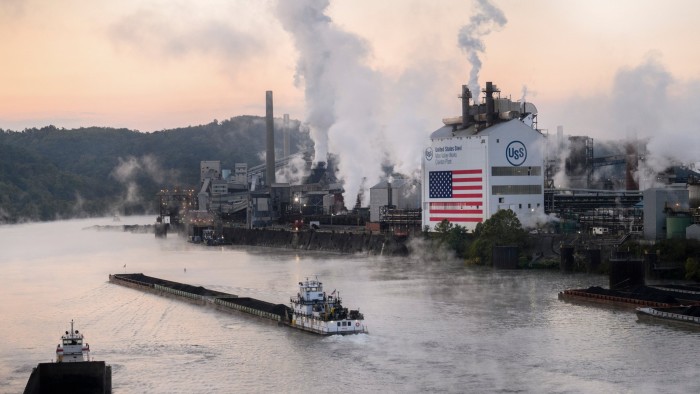Unlock the White House Watch newsletter for free
Your guide to what Trump’s second term means for Washington, business and the world
Japan’s Nippon Steel has quadrupled its investment pledge in US Steel over the next few years in a major push to win over President Donald Trump and gain approval for the politically fraught takeover.
Nippon, whose bid for the American company was blocked by his predecessor Joe Biden and opposed by Trump on the campaign trail, has bumped up its capital commitment to $11bn by 2028, according to two people familiar with the matter.
The Japanese company has also promised to add tens of thousands of jobs over a period of years, the two people added.
The deal’s enterprise value remains $14.9bn, but the investment commitment is four times as big as the $2.7bn pledge reiterated by the Japanese steelmaker in January. The pledge includes $1bn to build a new steel mill, on which a further $3bn is expected to be spent after 2028, the people added. Reuters first reported the development.
During a meeting with Japanese Prime Minister Shigeru Ishiba in February, Trump said Nippon Steel had abandoned the acquisition but would “invest heavily” in the Pittsburgh-based steel producer. People close to Nippon Steel said it had not given up on making a full acquisition.
$565mn
Break fee to be paid by Nippon Steel if the deal collapses
The efforts to push through Nippon Steel’s proposed takeover come as Japanese negotiators are seeking to lower a 24 per cent tariff on the country’s imports into the US introduced by the Trump administration. Japanese officials signalled their intent last week to hold out for a better agreement.
Since the transaction was first agreed in late 2023, it has been paralysed by national security and political concerns. Biden, Trump and then vice-president Kamala Harris all expressed worries about or outright opposed the deal on the presidential campaign trail, following stiff opposition from the United Steelworkers, America’s largest industrial union.
In April, Trump ordered a new national security review of the proposed transaction by the Committee on Foreign Investment in the US, which is set to conclude on Wednesday.
The same committee failed to reach a consensus under the Biden administration in December, with the former president then blocking the deal at the beginning of this year.
The takeover agreement stipulates the two companies must close the transaction by mid-June, meaning that a final blessing from the White House would be needed in a matter of weeks. “This should increase the chances Nippon is successful in acquiring US Steel,” said Christopher LaFemina, an analyst at Jefferies.
The two companies had sued the Biden administration, accusing it of blocking in order to serve the former president’s “personal political agenda” in the run-up to the election. The companies and the US government subsequently asked an appeals court to pause the litigation until June 5. Nippon is on the hook for a $565mn break fee if the deal collapses.
A person familiar with the situation described the latest development as “Trump trying to get everything he can out of the negotiation process”.
Recommended
The company and its advisers have tried to propose various structures in order to meet that demand, including one where investment in the US by the Japanese group would increase its equity position over time. However, say people familiar with the matter, such proposals have so far been rebuffed.
Nippon’s vice-chair Takahiro Mori has made numerous US trips over the past several months in the hopes of securing an agreement. Last week, he visited Washington, Indiana and Pennsylvania, according to a person familiar with the matter.
“Multinational companies now understand that the formula for getting Trump’s favour is to float big numbers,” said Todd Tucker, industrial policy and trade director at the Roosevelt Institute think-tank.
He cautioned that “the key hold-up to the deal has always been” whether Nippon can make its investment pledges enforceable under the terms of a steel industry labour contract, which usually includes specific investment schedules for certain facilities.
US Steel and Nippon Steel declined to comment. The White House did not immediately respond to a request for comment.



